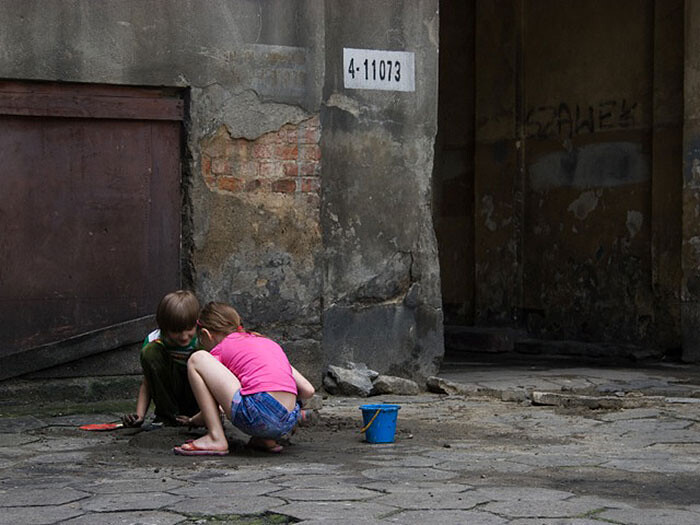In a dim, narrow courtyard, a pothole, ringed by pieces of broken concrete, has filled with dark water. The camera lingers on this scene in one unmoving five-minute shot, as two young boys meander around the confined concrete area, in Sharon Lockhart’s most recent film, Podworka (2009). One of the boys rides his small bicycle up to the pothole and regards it with intent curiosity. He starts an absorbing game of repeatedly dipping the bicycle’s wheels into the water and reacts by gleefully clapping his hands and laughing—the dirty puddle, an eyesore and inconvenience to some, is to him a toy and a marvel.
Filmed in the city of Lodz, Poland, Podworka consists of six scenes of children playing in different industrial-looking locations, and each scene is a static five-minute take. In Polish, Podworka translates to yard or backyard, and in this case, they are mostly blighted or graffiti-strewn, with a scraggly weed or two. Lockhart seems to have chosen her locations based on their function as impromptu playgrounds, and it is unclear whether she surreptitiously filmed many hours of footage to capture the children’s games, or asked them to play in front of her camera. The children’s blithe patterns of play evoke a secret world at odds with an urban landscape that looks abandoned—by both economic vitality and adult authority. These makeshift playgrounds in Lodz are worlds away from the safe primary-colored brightness of playgrounds in, say, Los Angeles, where Lockhart is based.
Amidst crumbling apartment walls and boarded windows, stray dogs and a flock of pigeons flit across the camera’s still gaze, as children invent games with sticks and rocks, play swords, or line up by height to kick a ball against a wall. This is a child’s world, where puddles, debris, and factories are imaginatively repurposed for endless uses. In one scene, as children climb around what looks like a shuttered factory, hanging from eaves and scrambling onto rooftops, their movements resemble training for the guerilla gymnastics of parkour. Despite the innocence of the children’s actions, the lack of supervision and the camera’s deadpan gaze lends a subtle sense of unease.
A kindred film by Mark Lewis provides a notable precedent. His Children’s Games, Heygate Estate (2002), consists of a single travelling shot along an elevated walkway in a modernist housing project in South London. Views of concrete apartments fill the frame, but intermittently, we glimpse children playing along the edges. In both cases, the severe surroundings are mitigated by the random, anarchic patterns of children’s play. But while children are on the fringes of Lewis’s film, they are the central subjects of Lockhart’s, whose work consistently scrutinizes everyday human acts.
This is not the first time Lockhart has focused on the world of children. In her film Pine Flat (2005), she took unmoving shots of similarly unsupervised children and teenagers in a small California mountain town as they read, played, slept, or waited for a bus. Here, as in Podworka, when Lockhart captures such natural behavior it remains ambiguous whether we are watching a performance or a documentary. Also at work is Lockhart’s constrained camerawork, which serves to immerse viewers within the confines of her immobile frame and heightens attention to everyday details—as seen in past works such as Lunchbreak, filmed in one tracking shot, and Exit (both 2008), composed of a single static shot. The close, horizonless gaze in Podworka conveys a sense of strict limits: although children run in and out of the frame, we sense an entrapment in their meager setting. But they scarcely seem to notice, reminding us that our environment is what we make of it.




